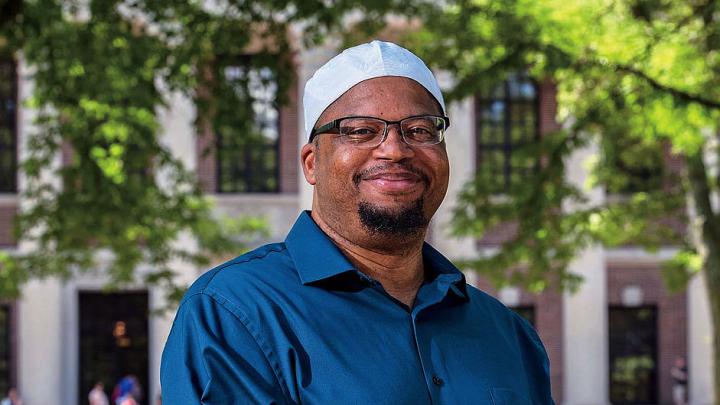As Harvard’s Muslim chaplain, Khalil Abdur-Rashid thinks of his work—including leading prayer each Friday, hosting seminars on Islamic ethics, and organizing community-building activities—as helping students to develop their “ ‘SQ,’ what I call their spiritual quotient.” In the process, he often finds himself helping them navigate multiple cultural identities. He knows what that’s like firsthand: his Muslim-convert parents raised him within a Southern Baptist extended family (“We did Ramadan, and we did Christmas”). They were active in education and politics in Atlanta, where he began his career as a social worker, investigating child-abuse cases for the state of Georgia. Then, 9/11 and its aftermath pushed him to explore his faith more deeply. He went abroad to Yemen and Turkey to study Islamic law before landing in a Ph.D. program at Columbia in 2010. There he also served as a religious-life adviser, commuting nearly two hours daily from Coney Island, where he was imam of a Brooklyn mosque. When news broke in 2012 of Muslim students being surveilled by the New York City Police Department, Abdur-Rashid spoke out, and was named to the police commissioner’s advisory council as a consultant on policy changes. Some months later, when three Jordanian students were violently threatened by a bus driver for speaking Arabic, he called up City Hall to demand action. “I was born and raised in a family of grassroots activists,” he says. But, in that moment, “I saw ‘oak tree activism.’ Activism from the institutional level, top down.” That experience informs Abdur-Rashid’s perspective on his current role. “There has to be somebody at the table, in the room, to advocate for students’ needs, who’s connected with major institutions,” he says. “That is the profoundness, I think, of this position.”
Khalil Abdur-Rashid

Khalil Abdur-RashidPhotograph by Jim Harrison
You might also like
Breaking Bread
Alexander Heffner ’12 plumbs the state of democracy.
Reading the Winds
Thai sailor Sophia Montgomery competes in the Olympics.
Chinese Trade Dragons
How Will China’s Rapid Growth in the Clean Technology Industry Reshape U.S.-China Policy?
Most popular
More to explore
Harvard Philosophy Professor Alison Simmons on "Being a Minded Thing"
A philosopher on perception, the canon, and being “a minded thing”







